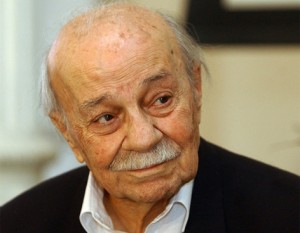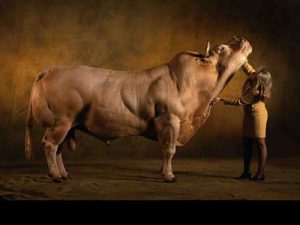 When Ernesto Sabato passed away on April 30 at the age of 99, he repeated the words of Maria Zambrano to himself: To die, this elusive action which is carried out by obeying, happens beyond reality, in another realm . In his house in Santos Lugarès (“Holy Places” near Buenos Aires), Ernesto Sabato obeys this last injunction. He has been preparing for it for a long time. In Resistance , his moving literary testament published in 2002, he wrote: I forgot large parts of my life, but, on the other hand, certain encounters, moments of danger and the names of those who pulled me out of depressions and bitterness still throbs in my hands. And yours too, you who believe in me, who have read my books and are going to help me die.
When Ernesto Sabato passed away on April 30 at the age of 99, he repeated the words of Maria Zambrano to himself: To die, this elusive action which is carried out by obeying, happens beyond reality, in another realm . In his house in Santos Lugarès (“Holy Places” near Buenos Aires), Ernesto Sabato obeys this last injunction. He has been preparing for it for a long time. In Resistance , his moving literary testament published in 2002, he wrote: I forgot large parts of my life, but, on the other hand, certain encounters, moments of danger and the names of those who pulled me out of depressions and bitterness still throbs in my hands. And yours too, you who believe in me, who have read my books and are going to help me die.
Tag: stupidity
Forgive me, there will always be something left...
In this little reflection on forgiveness, I just wanted to come back to the inadequacy of saying sorry. Forgiveness is sometimes extremely difficult. I admit I still have some grudges deep in my heart. I constantly confess them and ask for a little grace to soften the hardness of my heart, but no, nothing really helps, and I have rather learned to live with this hardness that I have despite everything managed to circumscribe, that I sincerely and intimately forgave. Why ? Why can't I grind this hardness of heart to dust? She seems stronger than me and that worries me, I can't hide it.
Continue reading “Forgive, there will always be something left…”
What death for the West?
It is more and more pleasant for me to hear these speeches of Westerners gargling about the death of Catholicism, the death of this old skin of religion, when it is not the death of God, quite simply.
Emmanuel Todd or intellectual vulgarity
Emmanuel Todd was on France Culture the other morning to give us his good word. Emmanuel Todd is a prophet. He's got it. Above all, he claims it. He doesn't have the honesty. Indeed, one cannot be a prophet and an ideologue.
Tribute to Jean-Marie Domenach
Rereading notes taken years ago while reading Jean-Marie Domenach 's Return to the Tragic , I remember our meeting. I see him arriving in my little studio at the Forks, asking me for a glass of wine and me, starting to explain to him through the menu the orientation that I wanted to give to our interview. And he looked at me with round eyes, rounding again, and suddenly throwing me enthusiastic: “But you have read my books… I'm not used to meeting journalists who have read my books”.
This meeting will remain as one of the very beautiful encounters I have had as a journalist. We will discuss more than two hours of morality and moralism, Saint-Just and Nietzsche. From God too. Above all from God.
Onfray's Eavesman Screams
So Onfray read a book revealing the fabric of Ernst Jünger… Michel Vanoosthuyse: Fascisme et literature pure .
It reveals – the self-proclaimed philosopher of sensuality always tells us – that Jünger was always a fascist and that he spent years, a large part of his life, half a century, erasing the traces of those fascist years. Anyone who rubbed shoulders with Ernst Jünger, even from afar, can only smile at these declarations. Ernst Jünger fabricating his life for posterity is grotesque. Jünger has always been the antithesis of this Machiavellian character whom Onfray believed he had flushed out in the course of a book. Finally realizing that this book by M. Vanoosthuyse was published by Agone editions ended up making me smile, one could hope that M. Vanoosthuyse would spend more time learning from Jünger than carrying out a witch hunt around himself. The back cover is thus singularly lacking in inspiration since it ends with these words: “what is covered by the entry of an author with a fascist past into 'pure' literature. “Kesako? Jünger would be the only right-wing author (I summarize here the thought of these left-wing gentlemen who give the fascist a yes or a no) to enter the literature? What is pure literature? Left-wing literature? It starts badly for the Agone editions which from the back cover do not show great editorial mastery...
As for Onfray, we understand throughout the article that only one thing worries him and in this perspective we could understand it - it is freedom, the extraordinary freedom of Jünger at any age, at any time until in his last days. Michel Onfray understands nothing about Jünger's freedom. So not understanding anything, he wants to hate her. He wants to show that it is a subterfuge. And Jünger spent half a century shaping it.
Because it must still have been the effort of a lifetime for Michel Onfray to be had. That it took this book to be denialized as he admits. We can only laugh, Michel Onfray is a maker when he wants. And he takes us for pumpkins. Who will believe for a single second that he ever loved Jünger? If Onfray says he loves Jünger, it's because he's showing off. He looks good. He holds forth. He means. I am. I think. Broad-mindedness. Ecumenism. Introspection. Critical mind. Tolerance again. Tolerance always. Good conscience. Yes, it is more than that. Michel Onfray will be able to spend several lives erasing the traces, it will be easy to exhume all the times he has pretended.
It's a shame, Michel Onfray also knows how to say certain things that do not belong to his clan, his camp, his political family. He sometimes knows how to slip through the cracks and recognize honesty in his adversaries. But he always has to let himself go, he always has to curl up, mediate so that he deceives… So much mess. It is difficult to understand how Michel Onfray can find any interest in Michel Vanoosthuyse's very small book… The impression given is equivalent to that of a beautiful dog with shiny hair rolling around in the mire.
The secular and modern world
 There is the beautiful Italian word "vergogna", there is the French word emptied of its meaning in modern times "shame".
There is the beautiful Italian word "vergogna", there is the French word emptied of its meaning in modern times "shame".
Who hasn't found themselves in the middle of a dinner with dear friends wanting to flee the place, to flee so as not to have to endure stupidity, incoherence, petty-bourgeois remarks, vulgarity? The need for clean air is felt when our lungs are no longer sufficient to store the little ambient air. Very often these people that we love, who only repeat what they have read in the newspapers, on blogs, irritate us… The Internet can be a pure enemy of intelligence.
Usually at these dinners, the worst will be reached when talking about religion.
The secular and modern world has enacted a monstrous, protean, incandescent law: religion will have to be confined to “the private sphere”. I put this last media expression in quotes for reasons that we will understand, as often with media expressions, it means nothing. I am not against the idea of a certain discretion in the practice of religion, but I am against the idea of hiding from being a Christian. Especially in a country like ours! But wouldn't the problem be there and nowhere else? Doesn't this country stop hating itself?